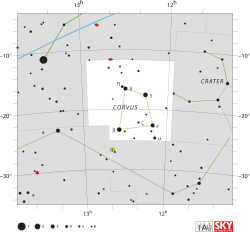Zeta Corvi

| |
| Observation data Epoch J2000.0 Equinox J2000.0 | |
|---|---|
| Constellation | Corvus |
| Right ascension | 12h 20m 33.64200s[1] |
| Declination | −22° 12′ 57.2410″[1] |
| Apparent magnitude (V) | 5.21[1] |
| Characteristics | |
| Evolutionary stage | Be star |
| Spectral type | B8V |
| Astrometry | |
| Radial velocity (Rv) | -6.40 ± 4.2 km/s |
| Proper motion (μ) | RA: -108.97 ± 0.22 mas/yr Dec.: -27.31 ± 0.11 mas/yr |
| Parallax (π) | 7.85 ± 0.22 mas |
| Distance | 420 ± 10 ly (127 ± 4 pc) |
| Details | |
| Luminosity | 154 L☉ |
| Temperature | 10695 K |
| Other designations | |
Zeta Corvi (ζ Crv, ζ Corvi) is a star in the constellation Corvus. It is a blue-white main sequence star of apparent magnitude 5.21. Located around 420 light-years distant, it shines with a luminosity approximately 154 times that of the Sun and has a surface temperature of 10,695 K.[2] It is a Be star, the presence of hydrogen emission lines in its spectrum indicating it has a circumstellar disk. It is separated by 7 arcseconds from the star HR 4691. The two may be an optical double or a true multiple star system, with a separation of at least 50,000 astronomical units and the stars taking 3.5 million years to orbit each other. HR 4691 is itself double, composed of an ageing yellow-orange giant whose spectral type has been calculated at K0 or G3, and an F-type main sequence star.[3]
References
- 1 2 3 basic query result — Object query : HD 107348
- ↑ McDonald, I.; Zijlstra, A. A.; Boyer, M. L. (2012). "Fundamental Parameters and Infrared Excesses of Hipparcos Stars". Monthly Notices of the Royal Astronomical Society. 427 (1): 343–57. arXiv:1208.2037
 . Bibcode:2012MNRAS.427..343M. doi:10.1111/j.1365-2966.2012.21873.x.
. Bibcode:2012MNRAS.427..343M. doi:10.1111/j.1365-2966.2012.21873.x. - ↑ Kaler, James B. (Jim) (26 April 2013), "Zeta Corvi", Stars, University of Illinois, retrieved 18 March 2015